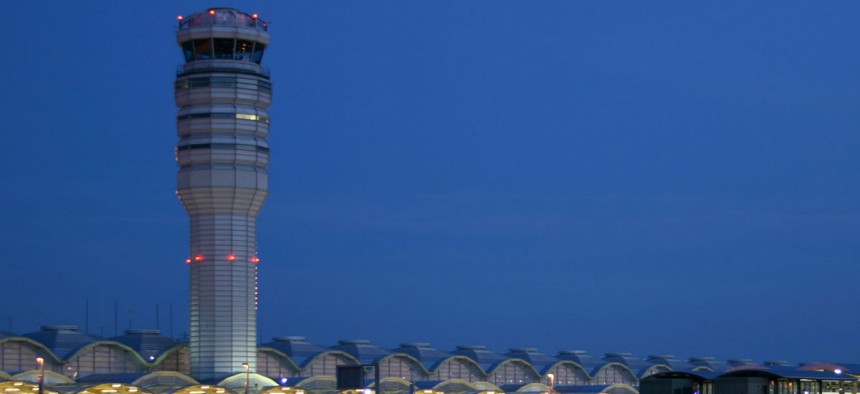
Douglas Litchfield / Shutterstock.com
Union Joins Lawmakers in Embracing De-Federalization of FAA
Air traffic controllers have reached a 'breaking point' with Congress' instability.
One federal employee group has an idea of how to free its members from the volatility of a dysfunctional Congress, bringing job stability and predictable funding: separate from the federal government.
The National Air Traffic Controllers Association, which represents 20,000 workers, has determined the system is broken and it would like to be removed from the process altogether. In a speech delivered Monday, NATCA President Paul Rinaldi called for the Federal Aviation Administration to dramatically shake up its structure.
Rinaldi joined a longstanding push from Republican members of Congress to de-federalize the FAA. Unlike some lawmakers, NATCA stressed it did not want to be part of a fully privatized, for-profit operation. And instead of trying to make a statement about the size and role of government, air traffic controllers are simply looking to shake the ebbs and flows of short-term funding bills, threatened and actual government shutdowns, threatened FAA-specific shutdowns and sequestration.
“The status quo of unstable, unpredictable funding for the National Airspace System has led to serious problems at the FAA,” Rinaldi said. “It cannot finance long-term projects, develop the system for new users or modernize our country’s aging infrastructure. The FAA has also struggled to maintain proper resources and staff at our busiest air traffic control facilities.”
FAA’s authorization is set to expire Oct. 1 of this year, the same day the full impact of sequestration is scheduled to kick back in. The agency last received its authorization in 2012 after surviving on 22 short-term extensions. Rinaldi said NATCA and FAA have “reached a breaking point,” but the solution must be carefully thought out and deliberately implemented.
Rep. Bill Shuster, R-Pa., who chairs the House Transportation and Infrastructure Committee, has said he would like to see a “transformational” FAA reauthorization bill later this year. Rep. John Mica, R-Fla., introduced legislation last week to break the agency away from government and turn it into an employee stock ownership entity. He said FAA continues to “fall further behind the rest of the world,” and the reform would make the air traffic system more modern and efficient.
For now, NATCA is focused on ensuring FAA receives its full funding, but welcomes the conversation about overhauling air traffic control as part of the process for reauthorization. The union would reject any proposal that converts the controllers into employees at a for-profit organization.
The Obama administration has not taken any steps to ease FAA out of government in whole or in part, with the Transportation Department announcing last month it would hire 6,000 new federal air traffic controllers over the next five years.
At a House hearing in March, NATCA spelled out the options for lawmakers considering FAA reform. In addition to the non-profit private model, the union suggested air traffic control could become a government corporation or receive special funding exceptions that provide a long-term authorization. Of course, the latter two models would still come with the very congressional oversight the union is looking to avoid. NATCA noted, however, it would create a “leaner bureaucracy” and fewer implementation challenges than full privatization.
“We believe that it’s critical that the specifics of any reform we do need to be shared with all stakeholders and discussed,” Rinaldi said on Monday. “Our air traffic control system is a continuous, highly critical operation; 24 hours a day, seven days a week, 365 days a year.”
(Image via Douglas Litchfield / Shutterstock.com)
NEXT STORY: DEA Chief to Resign Amid Sex Party Scandal







